「イマージョンのプールに飛び込んでいる子供たち」

|
|
もう飛び込んでみたよ
|
「英語活動」が全国の小学校で導入されてからはや4年。日本の公立小学校では英語はまだ正規科目ではなく、あくまで英語に触れる「活動」としての時間が設けられています。これは子供たちにとって幸福なことなのか、不幸なことなのか―各国の小学校の英語教育の実態を探りながら、ずっと考えてきました。そうした中で、出合ったのが「イマージョン教育」です。
It's been four years since English has been introduced into Japanese elementary school curriculums under the eigo-katsudo (or English activity) initiative, although it still isn't an official subject. I've been thinking about this for a long - whether it's necessarily a good or bad move for the children - and during that time, I became familiar with the "immersion" method.世の中に「もし」はないのですが、「もし英語を正規科目にする」としたら、理想の教育形態の一つとして「イマージョン教育」が挙げられると思います。(「イマージョン教育」については、昨年『飛び込んでみようか』の回で触れましたので、こちらをご覧ください 。)
If and when English does formally become a subject in Japanese elementary schools, I think the "immersion" method would be the ideal method of teaching.

|
|
ツェリン・ペムちゃんとカルマ君
|
さて、本コラムで1月にも取り上げたブータンですが、その「イマージョン教育」を国家方針として小学校から取り入れています。今回はブータンの小学生や現地に住む日本人にインタビューをし、よりその実態を探っていきたいと思います。 登場してくれるのは、現地在住7年の青木薫さんとツェリン・ペムちゃん(通称ペムちゃん、11歳)、そしてペムちゃんの弟のカルマ君(6歳)です。
Bhutan (featured in January on this site) has, however, already instituted an "immersion" program in elementary schools around the country. This week, we will be speaking to Ms. Kaoru Aoki, who has been living there for seven years, and two Bhutanese children (Tschering Pem, 11 years old, and her brother, Karma, six years old) about what they think about this policy.
◆
まずは、青木さんに語ってもらいます。
(First, let's start with Aoki-san.)
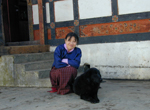
|
|
青木さんと愛犬
|
■ブータンの子供と英語について
(About Bhutanese Kids and English)
QUESTION :公立の小学校から「英語で」授業をするというのは、日本では考えられないことなのですが、実態はどのようなものでしょうか?
It's hard to imagine teaching subjects in English at public elementary school in Japan. Could you tell me more about what's going on in Bhutan?
Aoki-san:
A:英語は土曜日を除いて毎日あります。自国語であるゾンカ語の教科書以外はすべて英語なので、毎日「英語」にどっぷりつかっています。達者になって当たり前ですね。本屋に並ぶ本は100:1くらいの割合で英語本の圧勝です。新聞発行部数も勝負にならないほど差があります。ケーブルテレビで配信される番組も英語とお隣インドの言葉での放送がほとんどです。実はゾンカ語能力の低下は、ブータン社会で今深刻な問題になっています。高学歴を望むには英語が必須なので、親も英語教育にしゃかりきになるため、国語であるゾンカ語が苦手な子供が増え、たいていの落第者の赤点はゾンカ語もしくは算数です。
(In Bhutan, the kids learn English at school, except on Saturdays and Sundays when there is no school. All the textbooks are in English except for their Dzongkha textbook. So it's clear why they are so quick to master English. In a bookstore, most of the books are in English. Let's say 100 English books to one Dzongkha book. It's the same thing for newspapers. In fact, this is a serious problem for Bhutan. If you want higher education, you have to know English. Parents here are obsessed with English and so Dzongkha often becomes secondary. Usually, Dzongkha and math are a kid's weakest subjects.)
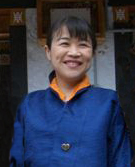
|
|
青木薫さん
|
■
抱えている問題について
(Problems)
QUESTION :
なるほど。母国語とのバランスをとるのは相当難しいようですね。
I see. It seems quite difficult to keep the right balance between English and one's mother tongue.
Aoki-san:
そうですね。一般にゾンカ語専門コース以外の生徒・学生は、手紙もゾンカ語で書くことができません。だから、ラブレターも英語になってしまう。また、ほかの教科も英語で教えるというシステムのため、英語が苦手な子はすべての教科が苦手という結果になっています。
(Generally speaking, students who haven't majored in Dzongkha won't be able to write a basic letter in Dzongkha. This means their love letters are written in English. The Bhutanese education system, which is famous for teaching all subjects in English, causes some problems for students who are not good at English. If they are bad at English, it affects their other subjects.)
特にブータンでは宿題の量も多く、要求される質も日本では想像できないほど高いので、両親が学校に通ったことのない人だと、英語の読み書きができないため、子どもの宿題も見てあげられないと悩んでいる人もいます。また、一般に授業は中の上くらいの生徒をターゲットに行なわれるため、授業を理解しないでいる子供たちは、どんどんおいていかれ、こういった子の救済システムがありません。数年前までは教師がバイトで家庭塾などを開いていましたが、政府が公務員教師のバイトを一切禁止したため、ますます落ちこぼれた子はそのまま…というのが現実です。ブータンで暮らしている外国人としては、ゾンカ語は話し言葉としては必要ですが、読めない、書けないからといって、特に困る場面はありません。でも、英語ができないと、いろいろ大変です。
( The kids have a lot of homework, much more than you can imagine — in terms of quantity and difficulty. If their parents have never been to school, they are unable to read or write in English. How do they help their kids do their homework? It's a big problem for them.
Also, the classes are pitched at students who have a greater than average academic skill. It's tough for kids who have problems keeping up. A few years ago, extra classes were provided for these kids by teachers. Now this is prohibited by the government. Teachers are not permitted to do any extra work. As a foreigner who lives in Bhutan, I find I need to understand spoken Dzongkha. That's all. You won't have any great problems if you can't read or write it. English, though, is absolutely necessary. )

|
|
算数も英語で勉強するよ
|
■
先生との会話について
(Talking to teachers)
QUESTION:
学校での教育は英語とのことですが、先生と話すときも常に英語なのでしょうか?それとも授業中のみ英語で、休み時間などはゾンカ語なのでしょうか?
If classes are held in English, do students speak to their teachers in English all the time? Or do they just speak English in class and use Dzongkha outside class?
Aoki-san:
学校では、校内では英語とゾンカ語を使いましょうと指導しています。ぺムちゃんの通っている学校も、先生と話すときは英語かゾンカ語だそうです。休憩時間などは、つい別の言葉を使ったりすることはあるようでが、学校の友だちとはゾンカ語で話すというのが普通です。子供たちにはそれが当たり前のようです。
(At school, they speak in both English and Dzongkha. It's the same situation at Pem's school. Sometimes they can't help speaking in other languages, but usually they speak in Dzongkha. It's second nature to them.)
■学校以外の「英語教育」について
(English education outside school)
QUESTION:
日本には、英会話学校が街にあふれていますが、ブータンではどうなのでしょうか?
ブータンにも塾はあるとのことですが、ブータンの子供たちも「英語の塾」に通うことがあるのでしょうか?
In Japan, there are a lot of eikaiwa gakko - private English conversation schools. What's the situation in Bhutan? I heard there are cram schools there, like in Japan. Do Bhutanese kids also go to cram school to learn English?

|
|
ブータンの教室風景
|
Aoki-san:
日本でいう大規模な「英会話学校」はないですね。ネイティブの外国人が個人的に開いている英語教室に通っている子供たちはいます。ブータン人教師による「英語の塾」もあります。経済的に余裕のある教育熱心な家庭では、英語の家庭教師を雇っていることもあるそうです。母国語のゾンカ語に関していえば、昨年私立の「ゾンカ語学校」がブータンで初めて開設され、結構生徒を集めていると聞いています。
(No, there aren't any big private English language schools like there are in Japan. There are some kids who study English with native English speakers. There are also cram schools where they can study English with Bhutanese teachers. In some cases, particularly in wealthy families, the children are taught English privately by a tutor. As for Dzongkha, a private Dzongkha language school just opened last year. It's the first in Bhutan and I've heard it has quite a good reputation.)
■
ブータンの言語教育について
(Language education in Bhutan)
QUESTION:
ブータンの言語教育について、いいところ・悪いところを教えてください。
What do you think are the pros and cons of language education in Bhutan?
Aoki-san:
ブータンは実は多言語の国なので、子供たちが自分の母語でない言葉に対して自然体で臨んでいるというのが、まずこの国の言語教育の有利なところだと思います。一つの家庭でも3種類くらいの言葉が飛び交うのが当たり前ですから、英語に対しても日本人ほど抵抗がない。また英語に関していえば、学んだことが即、使える場があり、また使わなくてはならない場面もあるので、どんどん能力が伸びていきます。
(Bhutan is a multi-lingual country. So the children take it for granted that they have to learn other languages. I think it's one of the great merits of this country. Even at home, they speak about three different languages. It means they don't have that much difficulty learning English, like Japanese have. Besides, they can practice these other languages outside school.They have to use it on a day-to-day basis. So their English ability develops very quickly.) 悪い点は、学校だけでなくすべての生活の中で、あまりにも英語の比重が大き過ぎるということです。英語以外の言語は、話し言葉としてしか存在していないような気さえします。英語以外の言葉に興味があっても、それを使える場面が少ないため、必然的にその言葉を学ばなくなるということでしょうか。これが地方の一言語ならまだしも、ブータンの国語ゾンカ語の現状なのですから、ことは深刻です。
(
On the other hand, I think too much importance is placed on English at the expense of other languages. It seems languages other than English are only considered important in their spoken form. Even if you're interested in acquiring a deeper knowledge of languages other than English, there are no places that allow you study it. So you miss out. This is particularly the case with Dzongkha. You'll see how serious the problem is.)
◆
次に現地の小学生、ペムちゃんと弟のカルマ君に登場してもらいましょう。
(And over to Pem and Karma.)
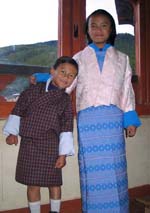
|
|
お姉ちゃんと一緒
|
■英語について
(About English)
QUESTION :
まず、英語は何歳から勉強しているの?初めて英語を習ったのはどこで?
First of all, where and when did you start learning English?
Pem-chan:
4歳の時。小学校の準備学年(PP)で。
(When I was four years old, at pre-school.)
Karma:
6歳から。PPクラスで去年から。
(Since last year, when I was six.)

|
|
お母さんは機織名人
|
■
英語の授業について
(About English lessons)
QUESTION :
ペムちゃん、小学校から突然「英語で」授業を受けるのは大変じゃない?
Isn't it hard to take courses in English all of a sudden at elementary school, Pem?
Pem-chan:
大変だったのかな?そうかな?
( Was it hard ?mmm?)
※お母さんの声:最初は授業についていけなくて、毎日お父さんに勉強をみてもらいながら泣いていました。特にこの子は4歳で入学したので。でももう、つらかったことは忘れてしまったみたいですね。
(
Pem's mother: At first, she used to cry because she could not keep up with the class. Her father had to help her with her homework every day — especially because she started preliminary school when she was four. But the hard times are behind us now. )

|
|
カルマ君
|
QUESTION :
弟さんはどう?
How about you, Karma?
Karma:
小学校に入るまではお母さんの言葉※(ツァンラカ語)だけだったよ。英語の授業は面白いよ。英語のアニメも好き!
(Before I started going to school, I just spoke Tzuranka. It's my mum's language. I enjoy having English lessons at school. I love English cartoons, too!)
※青木さんのコメント:昨年の2月までは英語はさっぱり通じませんでしたが、昨年の秋くらいからめきめき上達。いまや私との会話はほぼ英語で、その進歩にびっくりします。ちなみに彼の大好きな「英語のアニメ」というのは、日本のアニメーションの英語版です。
(
Aoki-san: Karma didn't know any English until February last year. But his English improved dramatically last autumn. Most of our conversation is now in English. I'm so pleasantly surprised with his progress. And by the way, his favorite English cartoons are Japanese anime dubbed into English.)
※ぺムちゃんの家庭で話されるのは、ご両親の母語である「ツァンラカ語」と呼ばれる東ブータンのタシガン県を中心にした地方の言葉です。※ In Pem's home, they speak Tzuranka, which is spoken in Western Bhutan.
■お友達とお話しするとき使う言葉について
(Languages you speak with your friends)
QUESTION:
じゃあ、「英語で」お勉強をしている教室内でのお友達との会話はやっぱり英語なの?それともゾンカ語なの?
(So, Which language do you use at classroom when you speak with your friends?
Do you speak in English or in Dzongkha?)
Pem-chan:
英語の授業中には英語しか使ってはいけない決まりなので英語です。おしゃべりは英語かゾンカ語。
( I only speak in English during class, because it's the rule. When I chat with my friends, we use both English and Dzongkha. )
Karma:
学校では、友達とはゾンカと英語。先生に怒られるもん。
(I talk with my friends in Dzongkha and in English. Otherwise, my teacher will scold us. )
■学校以外で英語を使う機会について
(Opportunities to speak English outside school)
QUESTION :
普段の生活で、例えば学校以外に英語を使う機会はあるの?
(Do you have any chance to use your English outside school?)
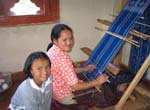
|
|
普段着のペムちゃん
|
Pem-chan:
町で先生に会ったときや、外国の人と話すとき。あと、お買い物のときの値段や、友達との電話で待ち合わせ時間を決めるときなんかは英語かな。長いお休みのときは、物語を読むのに夢中になって、それは全て英語です。
( Yes, when I see my teachers or talk with foreigners in town. And I do speak English when I go shopping - say, for prices. When I call my friends on the phone, we use English for arranging when we'll meet. All of the books I read during my holidays are in English.)
※ぺムちゃんの本棚には『不思議の国のアリス』『ジャングルブック』『トムソーヤの冒険』『親指姫』『黒馬物語』『ベニスの商人』『ガリバー旅行記』などが入った全集が並んでいます。また、『ハリー・ポッターと賢者の石』もあります。
(On Pem's bookshelf, there are many books, such as "Alice in Wonderland," "The Jungle Book," "The Adventures of Tom Sawyer," "The Little Princess" "The Merchant of Venice" "Gulliver's Travels," '"Harry Potter and the Chamber of Secrets".)
karma:
うーん。外国人に英語で話しかけられたら、英語を使うよ。
( Well, I speak in English when foreigners talk to me in English.)
■
おうちで話す言葉について
(The language you use at home)
QUESTION:
おうちでは英語で話したりするの?
Do you speak in English at home?
Pem-chan:
うちでは使わないです。ときどき、お父さんや叔父さんに英語で質問されたりするけど、家族の間では使わないです。
( No, I don't use it at home. My father and uncle sometimes ask me questions in English, though. But no, normally we don't use it among family.)
Karma:
僕もお姉ちゃんと一緒。うちでは使わないよ。
(Same as my sister. I don't speak it at home.)
■
夢について
(Your dreams)
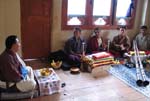
|
|
一番左がお父さん・リムドという法要で
|
QUESTION: 将来の夢は?
What are your dreams?
Pem-chan:
医師になりたいです。(I want to be a doctor.)
Karma:
僕は、お父さんになりたい。(I want to be a father.)
※父親になりたいという意味でなく、彼のお父さんのような大人になりたいという意味です。
(It does not mean that he wants to be a father, but he wants to be a person like his father.)
編集後記

|
|
英語とゾンカ語を話すよ
|
「小学校から英語で教育しているんだって」「わー、いいなぁ。じゃあ、英語が話せるんでしょう?」
おそらく、ブータンでの初等教育を知った人の多くは、こんな反応を示すのではないだろうか。聞けば日本人の保護者の7割が、小学校からの英語教育に賛成しているといわれる。
英語漬けのブータンの子供どもたち。そんな中にあって「英語が話せる」ようになる一方で、「母国語とのバランス」が問題になっているのも事実だ。また、「英語、英語」としゃかりきになる親の元で子供がどれだけプレッシャーを感じていることか。
ブータンの小学校には進級試験があり、また各学年では年に2回大きな試験がある。試験の季節の7月と12月になると、成績が悪かったのか、泣きながら通学路を歩く子供の姿がよく見られるという。子供はその小さな体に、大人が想像する以上の苦しみや繊細な心を持っているのではないだろうか。
"English education starts from elementary school?"
"That's great. So they must be good English speakers then."
Perhaps your reaction would be like this:
I've heard that 70 percent of Japanese parents who have kids in elementary school are in favor of English education at an elementary school level.
Bhutanese kids go through an English immersion program. So they will be good English speakers, but they have problems finding a balance between using their mother tongue - Dzongkha - and English. There's also a lot of pressure on them from their parents to learn English.
In Bhutan, students have to pass an exam before they progress to the next grade. There are two big exams each year - in July and in December. At those times, you'll often see kids crying as they go home from school. They're sensitive to all the pressure.
子供によく聞く質問として、「将来の夢」があると思う。今回のインタビューでもペムちゃん、カルマ君に夢を語ってもらったが、なぜ大人は子供に夢を聞きたがるのだろう。
One of the questions that we most frequently ask kids is: What do you want to be when you grow up? I asked Pem and Karma this. So why do we always ask this question?

|
|
夢って・・・?
|
最近、「子供たちと将来の夢」について興味深いエピソードがあった。まずはNHKの「ようこそ先輩」から。番組の中で、作家の石田衣良さんが母校の小学校を訪ねて、「この中で夢がない人はいる?夢を聞かれるのが嫌な人はいる?」と聞くと、驚いたことにクラスの1/3ぐらいの生徒が手を挙げたのだ。「その理由は?」と聞かれて、ある生徒は「別に聞かれるのが嫌ってことはないけど、かなえなきゃいけないっていうのがプレッシャーになるし、頑張れって言われるのもプレッシャーになるから」と答えていた。
Recently, I saw a program on NHK called "Yokoso Senpai". The writer, Ira Ishida, visited his old elementary school where he asked the children: "Is there anyone here who doesn't know what he want to be when he grows up? Or who hates being asked that question?" To my surprise, about a third of the children raised their hands. Being asked why, one answered: "Well, I'm not saying I don't like that question, but when I get asked that question I feel a kind of pressure on me, and when people say "Do your best. Realize your dreams." it just adds to the pressure."
また、同じころ『週刊文春』で、義家弘介さんの「子どもたちこそ『夢そのもの』だ」と題されたコラムを読んだ。今の子供たちは大人たち同様、周りからのプレッシャーに疲れているのだという。そして自分の夢がない子供、答えられない子供が増えているというのだ。著者は、「子どもたちこそ『夢そのもの』であり、授かった生を最後まで全うすることこそが『夢をかなえる』ということなんだよ」と大人が言って、抱きしめてあげるべきだと結論づけている。
どこの国の子供たちも、今まさにこんな言葉が必要なのではないだろうか。ブータンでのイマージョン教育の実状を聞いたあと、ふとそんなことを思った。
Around the same time, I read an article by Hiroyuki Yoshiie in "Shukan Bunshun" called "Children should just grow up to be themselves." He wrote: "Children are tired of the pressure, like us. The number of children who don't know what they want to be or do when they grow up - or who hate being asked that question - is growing." He concluded that we should hug them, saying, "All you have to be is yourself. Realizing your dreams means being yourself until the end."
After researching the Bhutanese immersion program, I think children need to hear these words, regardless of which country they're from.
ブータン英語教室はこちら
|















